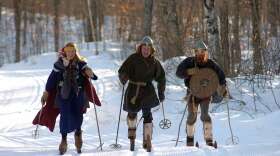Here in Milwaukee the true start of summer begins when the gates of the Henry Meier Summerfest grounds open. And for the past 30 years the festival to kick off the season has been PrideFest.
Over the course of this weekend, PrideFest will host many national and local performers - such as Betty Who, 10,000 Maniacs and Todrick Hall. While celebrating its 30th anniversary, the fest will also honor the many community leaders and programs that have contributed to Milwaukee's tradition of LGBTQ+ pride.
"I would say that PrideFest is viewed maybe a little differently than some of the other festivals in that we are a really dedicated community festival that makes a stand to give back," says Jorna Taylor of the Milwaukee Pride, Inc. Board of Directors.
Each year PrideFest chooses a beneficiary to honor and support, and this year's selected organization is GSAFE. The nonprofit creates just schools for LGBTQ+ youth in Wisconsin through leadership development, support of Gay-Straight Alliances and educator training.
"We felt that we needed to take a stand for Wisconsin's LGBT students and youth because our next generation of leadership comes from that talent pool. And if it is not protected and if it is not cultivated, and if those youth do not feel confident and secure enough in themselves - they may never be those leaders," explains local historian, author and Milwaukee Pride Board Vice President, Michail Takach.
PrideFest will also host activist Jim OBergefell as the keynote speaker and will honor local community leaders in its opening ceremony on Friday, June 9. All active military members and veterans will also free admission all weekend.
However, PrideFest was not always a festival that brought thousands of people to Milwaukee's lakeshore. For much of its early history, it was a difficult event to organize and host. This was a time when there was vast social pressure to not exist openly.

"The act of taking pride in your community really was making a stand and marching or rallying. It wasn't going to a parade and having fun - it was really more of an active statement," says Takach.
According to Takach, the first actual PrideFest wasn't until September 10, 1988, but the first picnic in 1987 was held at Mitchell Park. "It had more of a community get-together potluck feel and it was just an afternoon," he says.
Jump to thirty years later, the festival now welcomes national and international talent, has over 150 acts on eight stages and welcomes national and local political leaders - thanks to the grassroots efforts of the Milwaukee community.

"It's much easier to do this work today...than it was 30 years ago," says Takach. "The people who really pulled this together in the late '80s really have to be commended because not only were they under tremendous social pressure not to exist, but they did not have the sponsors, donors, volunteers and entertainment and resources we have today."
Two of the leaders instrumental in forming and sustaining PrideFest, Sheldon Schur and Rick Finger, both passed away this year. Many of their efforts are included in the PrideFest history building along with UW-Milwaukee's Archives and Special Collections."We wouldn't be having a Pridefest if it wasn't for their contributions," notes Takach.
Over the course of its 30 year history, PrideFest has had to change with the times. This year, many LGBT events across the country have turned celebrations into a platform for protest.
READ: From Pride To Protest: LGBT Parades Take On A New Tone This Year
"One thing that we sometimes are challenged with is that we have gone away from the resistance, away from the defiance, the original nature of pride," says Takach. "I think that this year we have really focused our efforts on bringing in talent that goes back to that original spirit. Bringing in speakers who really remind us why the battle for LGBT civil rights did not end with marriage equality."
He also notes that as the festival continues, the organizers continue to be conscious of how PrideFest can change to reflect its diverse community and that this year "will be a very different PrideFest."
"As we look forward to the future we need to start thinking of new and fresh ways about how we represent ourselves and the community," Takach says.
He encourages all attendees to "look beyond the headliners" and truly appreciate the history, local talent and work that supporting organizations accomplish.








